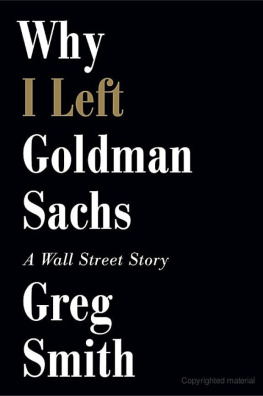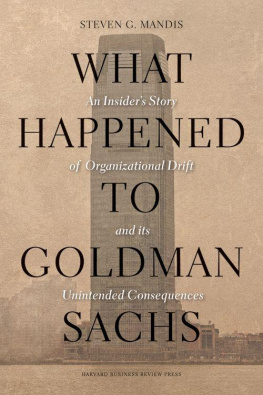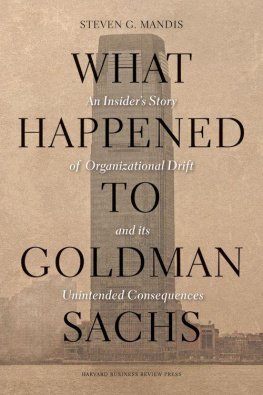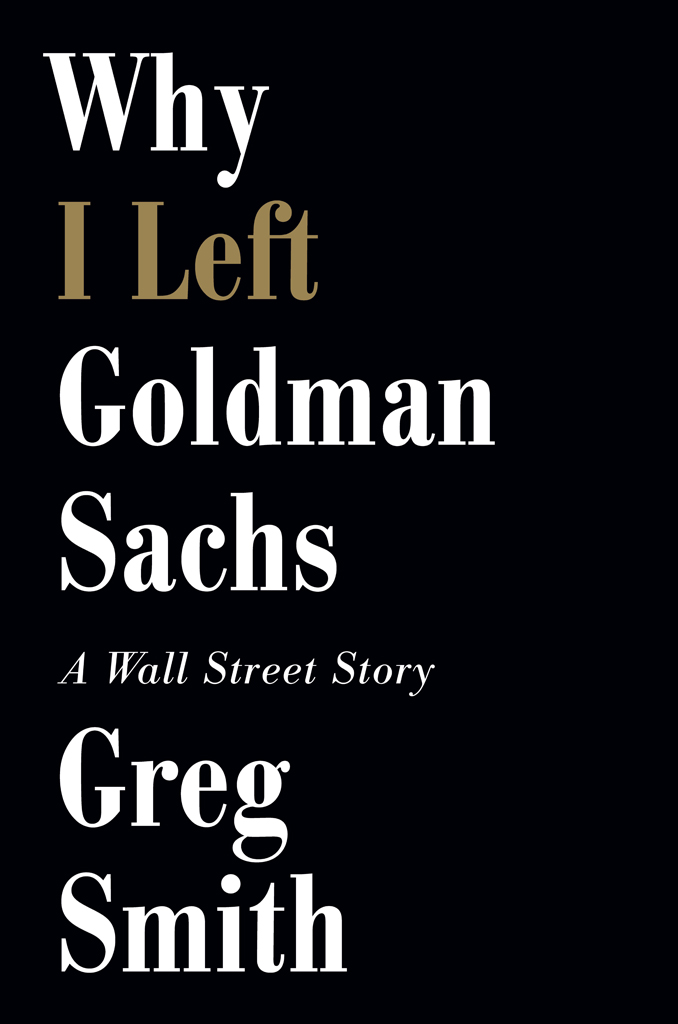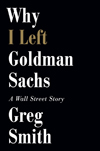
In accordance with the U.S. Copyright Act of 1976, the scanning, uploading, and electronic sharing of any part of this book without the permission of the publisher constitute unlawful piracy and theft of the authors intellectual property. If you would like to use material from the book (other than for review purposes), prior written permission must be obtained by contacting the publisher at permissions@hbgusa.com. Thank you for your support of the authors rights.
Thank you for buying this e-book, published by Hachette Digital.
To receive special offers, bonus content, and news about our latest e-books and apps, sign up for our newsletter.
Sign Up
Or visit us at hachettebookgroup.com/newsletters
Names and identifying details of some of the people portrayed in this book have been changed.
Copyright 2012 by Greg Smith
All rights reserved. In accordance with the US Copyright Act of 1976, the scanning, uploading, and electronic sharing of any part of this book without the permission of the publisher is unlawful piracy and theft of the authors intellectual property. If you would like to use material from the book (other than for review purposes), prior written permission must be obtained by contacting the publisher at permissions@hbgusa.com. Thank you for your support of the authors rights.
Portions of Why I Left Goldman Sachs first appeared as an op-ed in the New YorkTimes on March 14, 2012.
Grand Central Publishing
Hachette Book Group
237 Park Avenue
New York, NY 10017
www.hachettebookgroup.com
www.twitter.com/grandcentralpub
First e-book edition: October 2012
Grand Central Publishing is a division of Hachette Book Group, Inc.
The Grand Central Publishing name and logo is a trademark of Hachette Book Group, Inc.
The publisher is not responsible for websites (or their content) that are not owned by the publisher.
ISBN 978-1-4555-2748-9
To my mother
It was June 12, 2000, and I was sitting in a conference room at 125 Broad Street, thirty stories above Lower Manhattan. I was twenty-one years old, and it was the first day of my summer internship at Goldman Sachs. An intern named Josh was standing at the front of the room, red-faced, getting absolutely grilled. He was trying to explain risk arbitrage, but was floundering badly. What I didnt know at the time was that his dad was a billionaire and one of the most powerful financiers in the world. But this was Goldman Sachs, and it didnt matter who your dad was. You had to prove yourself like everyone else.
Welcome to Open Meeting: a form of boot camp for the seventy-five summer interns in the sales and trading program and a venerable tradition at the firm. A partner would stand at the front of the room with a list of names and call on people at will with questions on the firms storied culture, its history, on the stock markets. Rapid fire. You had to be alive, awake, informed. Two people cried that summer under the interrogation. But there was no way around it: if you wanted a full time job at Goldman Sachsless than 40 percent of the class would make itthis was a test you had to pass, over and over and over again.
An interns performance in the Open Meeting was one of the three criteria the firm used to determine who would receive offers after graduation to come work at the worlds most prestigious investment bank. During this ten-week internship, you also needed to find and cultivate a rabbi who would want to hire you. And youd have to shine in the meetings and get your rabbi while walking the fine line between being competitive and being nice. Partners were always looking to see whether an intern had the makings of a culture carrier, Goldman-speak for someone who is able to deal with clients and colleagues in a way that preserves the firms reputationone that has made it an incubator for senators, treasury secretaries, and central bank governors.
Interrogation and humiliation were not things this meticulously selected group had tasted very often. I was surrounded by the sort of superachievers that people whispered about and pointed at in Ivy League dining hallsthe ones who got perfect scores on their SATs, graduated from high school at age fifteen, swam in the Olympics, played chess at the master level for relaxation, and, oh, yeah, Mark Mulroney, whose dad had been prime minister of Canada. But even for these superachievers, this was a tough room. Do well here, and you would be on the path to a career where even the average middle manager makes $250,000 a year and exerts some power and influence.
I was a pharmacists son from Johannesburg, South Africa, and had never heard about investment banking until I got a scholarship to Stanford University and came to America for the first time.
Also flanking the whiteboard with Josh at the front of the room was another intern presenter named Adam, who would later become one of my best friends and go on to manage billions of dollars at a hedge fund. But at this moment, at the height of the Internet bubble on Wall Street, these two interns were under severe fire. Adam was flushed, too, but maybe it was just the thrill of the moment. An applied math major, he was crushing it; he knew his stuff cold. Josh, on the other hand, was an English major, and completely out of his depth.
There were two Open Meetings a week, held after the days work on the trading floor was finished, usually on Tuesdays and Thursdays. The ninety-minute meetings were usually run by (in order of rank) a partner, a managing director, or a tribunal of three angry vice presidents, sitting imperiously at a table at the front of the room. Depending on the personal style of the people in charge, the meetings could be brutal. They were always intense.
Open Meetings started at 6:00 P.M. on the dotnot 6:01 or 6:02. There were always three or four interns who got there at 6:03 or 6:05; they were almost always made to wait outside. If too many people arrived late, we would all have to come in at five the next morning for a makeup meeting; the partner would also show up at 5:00 A.M. Once again, if you arrived at 5:05, you were made to wait outside. This rule was strictly enforced. There were people who just couldnt get there on time, and it reflected poorly on them.
The interns sat behind long tables arranged in rows. On the tabletop in front of you, youd place a pad of paper containing your preparatory notes. At the head of the room, the person in charge, armed with a list of all the interns names, would kick off the meeting by cold-calling peoplejust picking names at random. Out at the rows of tables, every intern was praying, Please, dont let it be me.
I was nervous but ready. My strategy was to volunteer, very quickly, whenever I knew the answer to a questionthen those running the meeting would be less likely to pick on me later, for an answer I didnt know. Some people seemed totally unfazed by being called on; but several, male and female, seemed undone by the experience:
VP (pointing): Okay, third row, second seat over. Stand up and state your name.
INTERN (standing slowly): Brynn Thomas, Brown University.
VP (firmly): Tell me about Microsoft stock. What is our house view? What does our research analyst think?
INTERN (caught off guard): Um, I think we like it. Uhhh
VP (now angry): Come on, you should know these answers cold. Microsoft is one of the biggest and most important companies in the world. How can you not know this stuff?


